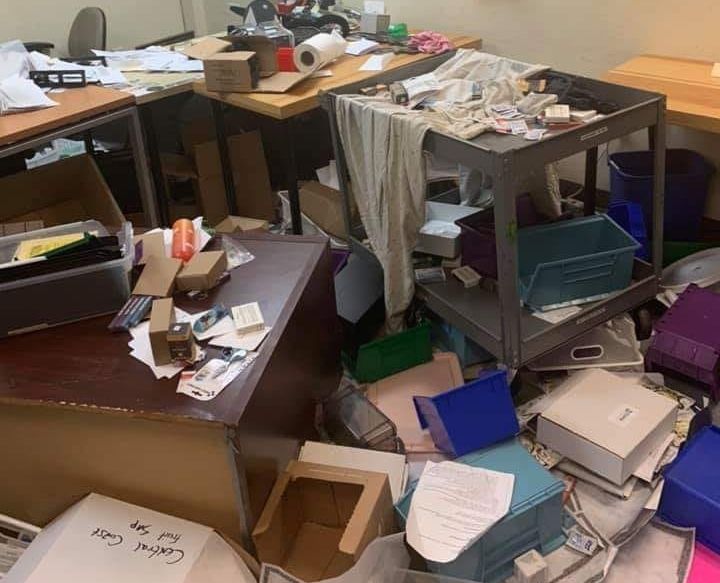The protests, lootings and robberies connected to the death of George Floyd in Minneapolis might have died down over the past two weeks, but scores of marijuana companies are still dealing with the fallout of break-ins that began the weekend of May 29.
Several of the hardest-hit shops estimated their losses and damages to be easily in the six figures, though none of the companies Marijuana Business Daily spoke with had yet completed cost analyses of how big the financial toll will be or how much their insurance might cover.
But the affected businesses – which range from shops owned by large multistate operators to tiny independent social equity companies in California – remain focused on rebuilding and reopening.
And at least one group of cannabis companies, in Oakland, California, is hoping the City Council will this week approve a declaration of emergency that the businesses believe could unlock state funds to help them rebuild, said Magnolia Wellness CEO Debby Goldsberry.
“The path forward is not simple or clear. It feels like a mountain,” Goldsberry said.
‘Months’ until return of normalcy
For Sue Taylor, the African American owner of the Farmacy Berkeley in California, the experience has been a trying one, but she’s optimistic her shop will be able to recover completely.
“Our loss of inventory is over $30,000, and the property damage is going to be more, because those windows cost us like $7,000 apiece, and the showcases, those are like $100,000. They were custom made,” said Taylor, whose store was hit by robbers at least three times during the protests.
Still, Taylor managed to get her shop reopened by June 3, she said, in part because of a solid amount of community support, with neighbors turning out to help clean up the mess the looters left in their wake.
Still, question marks remain.
“We don’t know what the insurance will or will not pay,” Taylor said, noting ” a lot of us are under the same insurance, so we don’t know how that’s going to pan out,” Taylor said.
In Pennsylvania and Illinois, PharmaCann is one of the larger marijuana companies that still has two shops closed for repairs – one in Manayunk, a suburb of Philadelphia, and another in Romeoville, a Chicago suburb.
Both shops, which operate under the PharmaCann brand Verilife, were damaged extensively and looted, easily to the tune of six figures, said Jeremy Unruh, PharmaCann’s senior vice president for public and regulatory affairs.
“I’d say that all told, between damage and lost product, we were into the hundreds of thousands of dollars at both locations,” Unruh said. “In Manayunk, we should be open in about two weeks, and in Romeoville, we’re looking to be open early next week.”
Both Unruh and Taylor said their top challenges in recent weeks have been figuring out insurance claims and making sure their staffing needs were met. Employees have continued to worry about their own safety, not just from the robberies but also because the coronavirus pandemic is still raging.
“We’ve got the challenge of operating as an essential business that the COVID-19 crisis represents,” Unruh said. “Compounding that, now you have the notion of making sure our employees feel safe from a security perspective.”
Building repairs costing time, sales
One of the primary reasons that PharmaCann’s shops and others have remained closed stems more from the extent of physical damage done to doors, windows and retail interiors, which all need to be repaired before a lot of shops can reopen.
Also in Chicago, 4Front Ventures President Kris Krane said it’ll likely take until sometime in July before his Mission store, on the city’s south side, will be able to reopen, primarily because that’s how long it will take to reinstall security doors and other features that were ripped out by looters.
“The thing that’s going to take the longest are the security doors that are being put in … in multiple places throughout the facility,” Krane said. “They have to be custom-cut, custom-produced and custom-installed. … You can’t rush that.”
Krane, like Taylor, said his business has received an overwhelming amount of support from the local community in its efforts to rebuild, as well as from other companies that operate in Illinois, which have also been offering whatever help they can.
“It was amazing to see how many people who turned out that Monday to help clean up,” he said. “If anything, this has hardened our resolve to be a good member of this community.”
Unrest over California issues
In Oakland, however, the episode has left some in the cannabis industry even more dissatisfied with their treatment at the hands of government officials.
Magnolia’s Goldsberry, along with other industry members, met last Thursday during an emergency session of the city’s Cannabis Regulatory Commission, and one of the common complaints was how little the local police and government officials have done to date to help companies that were robbed.
Goldsberry said that industry estimates are that nearly 40 cannabis businesses in Oakland alone were targeted during the robberies, and said police response was almost non-existent, despite the fact that robberies began Friday May 29 and continued nightly throughout that weekend.
“The city didn’t even warn us. They had 24 hours to warn us that five dispensaries had been robbed” on Friday, May 29, Goldsberry said.
“Right now we’re so disappointed. We haven’t heard a single word from the state, from the county. The city is finally taking some steps, so that’s good. But we’re pretty shocked by the lack of support,” Goldsberry said. “We really feel like they put us both in physical and fiscal danger.”
Goldsberry started a GoFundMe page for Ron Leggett, a social equity marijuana entrepreneur who’s been incubating his small retail business, Chiefing in a space given to him by Magnolia, after his company was wiped out by the looters, Goldsberry said.
“It was pretty debilitating for him because his product launch was scheduled for last week … on the 8th, and that obviously didn’t happen,” Goldsberry said. “They got destroyed right alongside of us.”
Still, Goldsberry is confident that both Magnolia and Chiefing will make comebacks this summer. It’s just a question of when, she said, predicting that Magnolia will reopen sometime in July.
John Schroyer can be reached at johns@mjbizdaily.com







